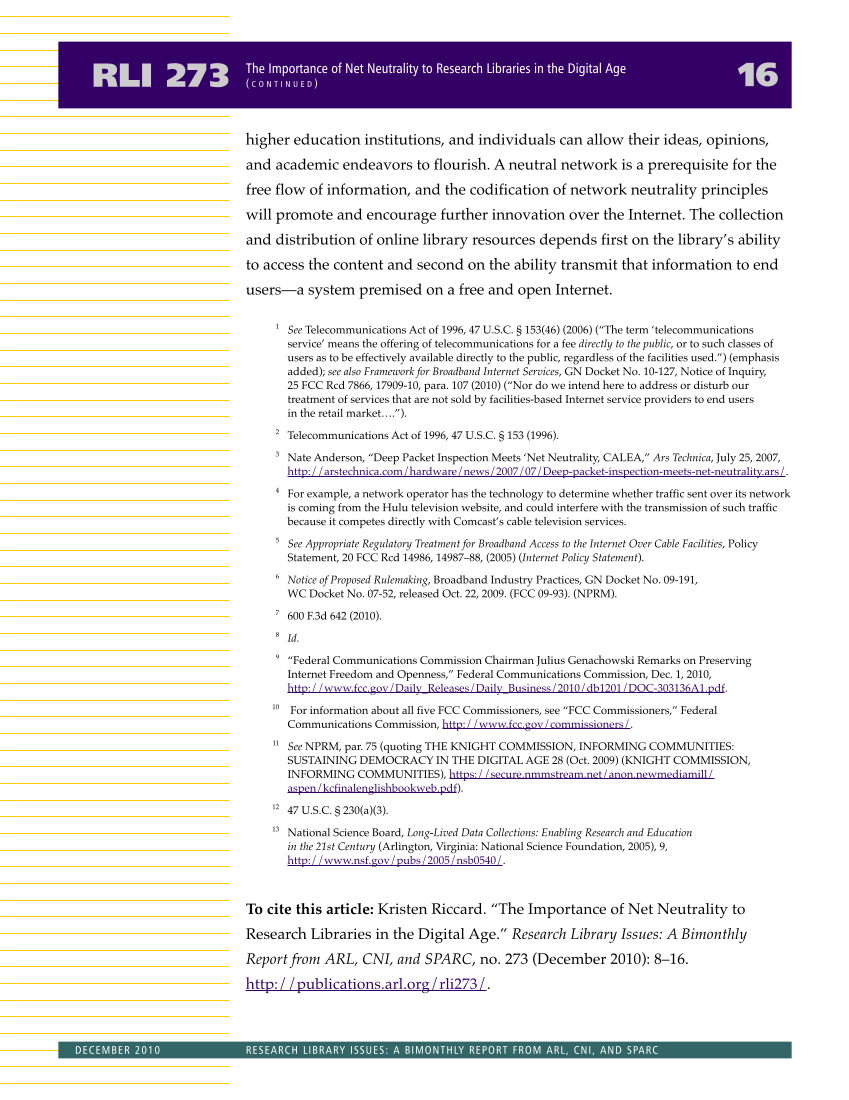higher education institutions, and individuals can allow their ideas, opinions, and academic endeavors to flourish. A neutral network is a prerequisite for the free flow of information, and the codification of network neutrality principles will promote and encourage further innovation over the Internet. The collection and distribution of online library resources depends first on the library’s ability to access the content and second on the ability transmit that information to end users—a system premised on a free and open Internet. 1 See Telecommunications Act of 1996, 47 U.S.C. § 153(46) (2006) (“The term ‘telecommunications service’ means the offering of telecommunications for a fee directly to the public, or to such classes of users as to be effectively available directly to the public, regardless of the facilities used.”) (emphasis added) see also Framework for Broadband Internet Services, GN Docket No. 10-127, Notice of Inquiry, 25 FCC Rcd 7866, 17909-10, para. 107 (2010) (“Nor do we intend here to address or disturb our treatment of services that are not sold by facilities-based Internet service providers to end users in the retail market….”). 2 Telecommunications Act of 1996, 47 U.S.C. § 153 (1996). 3 Nate Anderson, “Deep Packet Inspection Meets ‘Net Neutrality, CALEA,” Ars Technica, July 25, 2007, http://arstechnica.com/hardware/news/2007/07/Deep-packet-inspection-meets-net-neutrality.ars/. 4 For example, a network operator has the technology to determine whether traffic sent over its network is coming from the Hulu television website, and could interfere with the transmission of such traffic because it competes directly with Comcast’s cable television services. 5 See Appropriate Regulatory Treatment for Broadband Access to the Internet Over Cable Facilities, Policy Statement, 20 FCC Rcd 14986, 14987–88, (2005) (Internet Policy Statement). 6 Notice of Proposed Rulemaking, Broadband Industry Practices, GN Docket No. 09-191, WC Docket No. 07-52, released Oct. 22, 2009. (FCC 09-93). (NPRM). 7 600 F.3d 642 (2010). 8 Id. 9 “Federal Communications Commission Chairman Julius Genachowski Remarks on Preserving Internet Freedom and Openness,” Federal Communications Commission, Dec. 1, 2010, http://www.fcc.gov/Daily_Releases/Daily_Business/2010/db1201/DOC-303136A1.pdf. 10 For information about all five FCC Commissioners, see “FCC Commissioners,” Federal Communications Commission, http://www.fcc.gov/commissioners/. 11 See NPRM, par. 75 (quoting THE KNIGHT COMMISSION, INFORMING COMMUNITIES: SUSTAINING DEMOCRACY IN THE DIGITAL AGE 28 (Oct. 2009) (KNIGHT COMMISSION, INFORMING COMMUNITIES), https://secure.nmmstream.net/anon.newmediamill/ aspen/kcfinalenglishbookweb.pdf). 12 47 U.S.C. § 230(a)(3). 13 National Science Board, Long-Lived Data Collections: Enabling Research and Education in the 21st Century (Arlington, Virginia: National Science Foundation, 2005), 9, http://www.nsf.gov/pubs/2005/nsb0540/. To cite this article: Kristen Riccard. “The Importance of Net Neutrality to Research Libraries in the Digital Age.” Research Library Issues: A Bimonthly Report from ARL, CNI, and SPARC, no. 273 (December 2010): 8–16. http://publications.arl.org/rli273/. RLI 273 16 The Importance of Net Neutrality to Research Libraries in the Digital Age ( C O N T I N U E D ) DECEMBER 2010 RESEARCH LIBRARY ISSUES: A BIMONTHLY REPORT FROM ARL, CNI, AND SPARC







































